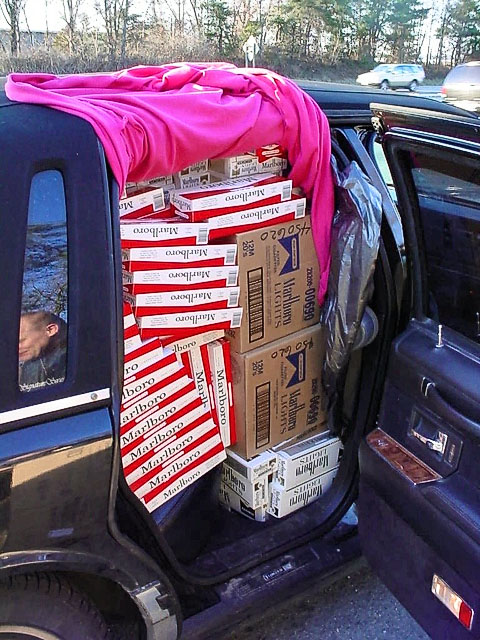What happens when one state’s taxes are much higher than another?
Economic activity moves to the low tax state or, in some cases, the high tax state becomes a smuggler’s paradise.
New York City and State now have a dubious distinction: They are the cigarette smuggling capitol of the United States.
Indeed, if you’re lighting up in New York, there’s a good chance that butt was not taxed here. That’s because the “unintended consequences” of high cigarette taxes have made New York City the undisputed American butt smuggling center of the United States, according to a new Tax Foundation study.
Taxes that Save Lives
City officials say they are aware of the huge extent of the illegal sales, but defend high cigarette taxes as saving lives.
New York State Department of Taxation and Finance officials declined talking to me in a recent story I did on cigarette taxes for the New York Post Sunday business section.
Still, that doesn’t change a fact: The Empire State, the report says, “is the highest net importer of smuggled cigarettes, totaling 56.8 percent of total cigarette consumption in the state.”
The report also said that, “smuggling in New York has risen sharply since 2006 (59 percent) as has the tax rate (190 percent).”
The study, “Cigarette Taxes and Cigarette Smuggling by State, 2015,” examined state/city tax receipts, the number of cigarette tax stamps and sales. It matched them against the number of cigarettes smoked from 2010-2015. It found lots of New York cigarette taxes are evaded.
$1 Billion Up in Smoke
The cost to the city and state in lost taxes is about $1 billion a year, the study found in its five-year study of butt buying patterns in New York.
The study concluded that New York has “the worst smuggling problem in America,” according to Scott Drenkard, director of state projects with the Tax Foundation. He said it is because “it has the highest cigarette taxes in the nation.”
New York State has a state tax of $4.35 and the city adds another $1.50 to a pack.
City officials, including a spokeswoman for the Department of Finance and New York City Sheriff Joe Fucito, didn’t dispute the study. However, they said the city vigorously pursues buttleggers. They defended the high tax policy although they concede lots of tax dollars aren’t collected by New York.
Indeed, in the five-year period in which cigarette taxes were repeatedly raised, New York cigarette tax receipts declined. Some quit but other smokers found a way around high taxes, the report said.
Some started illegal businesses in dealing the low tax cigarettes. Others were casual buyers of butts in low tax states. They are smokers who visit another state and buy a few cartons for personal use.
Leave the Casual Smokers Alone
Fucito said the city isn’t interested in going after casual buyers. That is unless they purchase very large amounts of cigarettes, amounts that would lead authorities to believe that the buyer is going to start selling to others. But more important than potential tax losses, Fucito argued, was the intent of high taxes.
“There’s always the debate over that we have the high tax and all this trafficking,” Fucito said. “But the Department of Health is very clear that the tax deters some people, not everybody, and that it actually saves some lives.”
However, Drenkard said the attempt to discourage smoking, with higher taxes in some states while others charge much less, leads to criminal activity.
“Growing cigarette tax differentials have made cigarette smuggling both a national problem and in some cases a lucrative criminal enterprise,” the report said.
Drenkard, who has testified to Congress, warns the high tax policy is often ignored.
“It is easy,” Drenkard notes, “to find bootlegged cigarettes in small New York City stores.”
Fucito agrees much illegal activity is at Mom and Pops.
However, he warns illegal dealers “risk losing a license and may never get it back.”
Hard words, indeed, especially for the bodegas and other small stores that depend on cigarette sales to survive. However, Drenkard contends that, as long as there is a tremendous price differential in the price of a pack of smokes from state to state, there will always be an incentive to smuggle.
He notes that the reverse has also happened. Those states with cigarette prices that weren’t outrageous compared to New York have found the amount of their butt smuggling go down.
I conclude a few things from this story: No matter what the service or the product, governments trying to control or set prices on a product or service far above market prices will find their efforts are often self-destructive, even though their intentions were sometimes good. (By the way, an example of the latter was the Federal Reserve keeping interest rates ridiculously low for many years, leading to crash of 2008. That was a real estate led mess caused, in part, by the government pushing cheap mortgages and the concept of every American owning a home, regardless of someone’s ability to pay for it).
My Prejudices
What do I believe?
And, by the way, I don’t smoke in part because I am too cheap (My nickname in Spanish is “El Mas Tacano de Todos,” the stingiest of them all). Governments should recognize their limitations in changing human nature. Whether it is discouraging smoking, overeating or unprotected sex, there is only so much government can or should try to do.
Yes, it should warn people about smoking or the dangers of drinking too many sodas. But ultimately, in a society that says it believes in liberty and government under law, there is only so much any government can do. Some people will smoke. And some people will overeat and become fat.
Sorry, that’s life or, unfortunately in the case of some people, early death. Laws and taxes can only change that to a certain extent.
![]()
